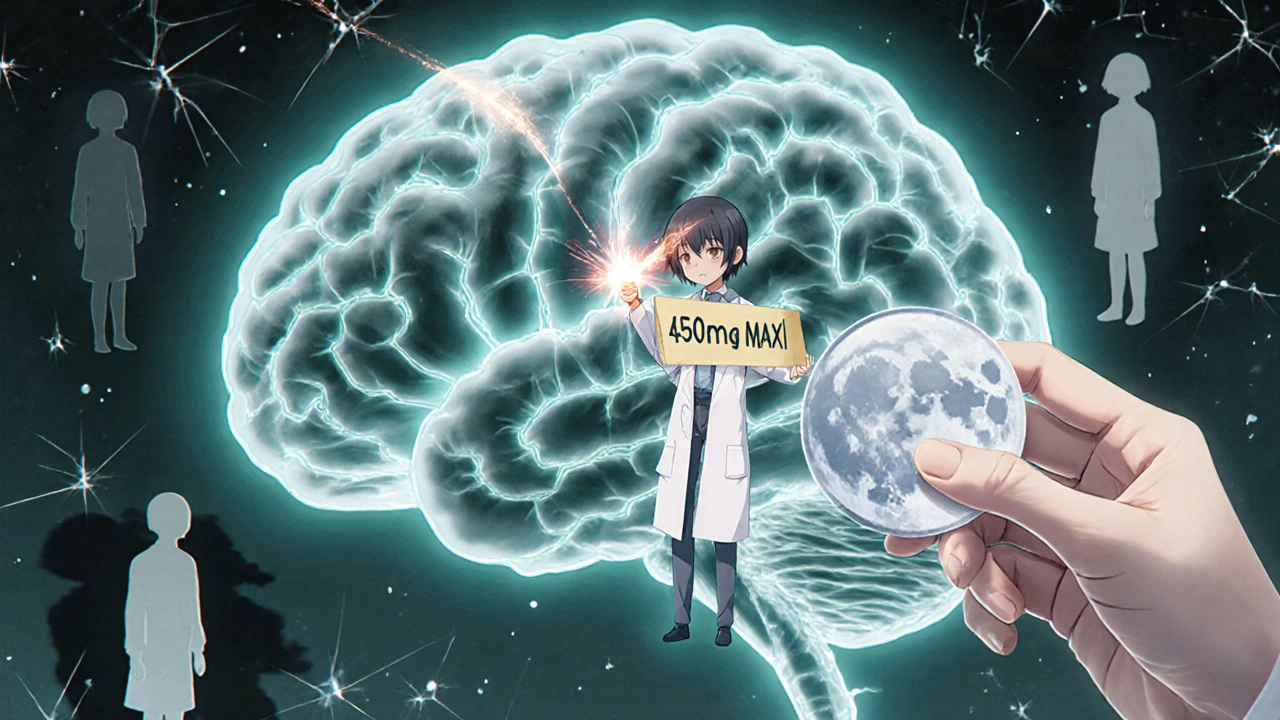Bupropion Seizure Risk Calculator
Calculate Your Seizure Risk
This tool estimates your risk of seizures when taking bupropion based on your medical history and current dosage. Seizure risk is highest at higher doses and with certain medical conditions.
Your Seizure Risk Assessment
Recommendations
When you’re trying to find an antidepressant that doesn’t wreck your sex life or pack on the pounds, bupropion-sold as Wellbutrin, Zyban, or Aplenzin-often comes up as a top choice. It’s one of the most prescribed antidepressants in the U.S., with nearly 18 million prescriptions filled in 2022. But for all its benefits, there are three big concerns that can make or break whether it’s right for you: insomnia, anxiety, and the risk of seizures. These aren’t rare side effects. They’re common enough that doctors need to screen for them before even writing the prescription.
Why Insomnia Hits Harder With Bupropion
Unlike SSRIs like Zoloft or Prozac, bupropion doesn’t boost serotonin. It increases dopamine and norepinephrine-two brain chemicals tied to alertness and energy. That’s great if you’re feeling sluggish. But if you’re already struggling to sleep, this can turn into a nightmare. Clinical trials show about 19% of people taking bupropion report insomnia. That’s nearly 1 in 5. On patient review sites like GoodRx, insomnia shows up in 38% of negative reviews. Reddit threads like “Wellbutrin insomnia nightmare” have hundreds of comments from people who say they couldn’t sleep for weeks after starting the drug. The timing matters. Bupropion peaks in your bloodstream 3 to 5 hours after you take it, depending on whether it’s the sustained-release (SR) or extended-release (XL) version. If you take it after noon-or worse, at night-you’re basically giving your brain a stimulant right when it should be winding down. That’s why doctors always recommend taking it in the morning. One study found that 68% of patients who moved their dose to the morning saw their sleep improve within days. There’s no magic fix. Cutting the dose doesn’t always help because even low doses can trigger insomnia in sensitive people. Some doctors add a small dose of trazodone or diphenhydramine at night, but that’s not ideal long-term. The best solution? Timing. Take it before 10 a.m., and avoid caffeine after lunch. If you’re still wide awake at midnight after two weeks, talk to your doctor. This isn’t something you just have to live with.Anxiety: Is It the Drug or the Depression?
It’s confusing. You start bupropion because you’re depressed, and then you feel more anxious. Jittery. On edge. Nervous. That’s not a sign you’re getting worse-it’s often just your brain adjusting. About 20-25% of people report increased anxiety or agitation in the first 1-2 weeks. Agitation alone hits 32% in trials, making it the most common side effect. This isn’t panic attacks or OCD-it’s a restless, on-edge feeling. You might pace. You might snap at people. You might feel like your nerves are exposed. The good news? This usually fades. Mayo Clinic says most patients notice improvement within 7-14 days. That’s because your brain is adapting to the new levels of dopamine and norepinephrine. But if it’s unbearable, don’t wait. Some doctors prescribe a short course of a benzodiazepine like lorazepam to help you get through the first week. Others switch to the extended-release version, which delivers the drug more smoothly and reduces spikes in nervousness. What’s not okay? If the anxiety keeps getting worse after two weeks. Or if you start having panic attacks, obsessive thoughts, or suicidal ideation. Those aren’t side effects-they’re warning signs. Bupropion can, in rare cases, trigger mania in people with undiagnosed bipolar disorder. If your mood swings wildly or you feel unusually euphoric, stop the drug and call your doctor immediately.The Seizure Risk: What No One Tells You
This is the one that scares doctors the most. Bupropion lowers your seizure threshold. That means your brain becomes more likely to have a seizure-even if you’ve never had one before. At the maximum recommended dose (450 mg/day for SR, 400 mg/day for XL), the risk is about 0.4%. That sounds low. But compare it to the general population: 0.01%. That’s 40 times higher. And if you go over 600 mg/day? The risk jumps to 2-5%. That’s not a typo. That’s a medical emergency waiting to happen. Who’s at highest risk? People with:- A history of seizures or head injury
- Eating disorders like anorexia or bulimia
- Severe liver disease
- Alcohol or drug withdrawal
- Other medications that lower seizure threshold (like antipsychotics or certain antibiotics)

Who Should Avoid Bupropion Altogether
Bupropion isn’t for everyone. Here’s when you should say no:- You’ve had a seizure before-even one as a kid
- You have an eating disorder (anorexia or bulimia)
- You’re actively withdrawing from alcohol or sedatives
- You’re on other meds that lower seizure threshold
- You have uncontrolled high blood pressure (above 180/120)
- You need to take it at night for sleep (it won’t help)
How to Use It Safely
If you and your doctor decide bupropion is right for you, here’s how to minimize the risks:- Start low: 150 mg once daily for at least 3-4 days before increasing
- Use extended-release (XL) if possible-it’s smoother and safer
- Take it in the morning, never after 2 p.m.
- Avoid alcohol completely-it raises seizure risk
- Don’t crush, chew, or break tablets. That can cause dangerous spikes
- Watch for muscle twitches, confusion, or unusual behavior
- Report any new anxiety or sleep problems early

What Happens If You Overdose?
Bupropion overdose is dangerous. As little as 2.7 grams can trigger seizures, heart rhythm problems, and coma. In one case, a patient took 6 grams and ended up in the ICU with multiple seizures and QT prolongation-a heart rhythm issue that can be fatal. Symptoms of overdose include:- Seizures
- Fast or irregular heartbeat
- Confusion, hallucinations
- Vomiting, tremors
- Loss of consciousness
Is Bupropion Right for You?
It’s a powerful tool. But like any tool, it can hurt you if you don’t use it right. You might be a good candidate if:- You’ve tried SSRIs and hated the sexual side effects
- You’re trying to quit smoking
- You’re worried about weight gain
- You’re not prone to seizures or anxiety
- You can commit to morning dosing
- You have a seizure history
- You have an eating disorder
- You drink heavily or are withdrawing
- You’re already struggling with insomnia or panic
Can bupropion cause seizures even if I’ve never had one before?
Yes. Bupropion lowers your brain’s seizure threshold, meaning it can trigger a seizure even in people with no prior history. The risk is low at recommended doses (about 0.4%), but it increases sharply above 450 mg per day. People with eating disorders, liver disease, or a history of head injury are at higher risk. Never increase your dose without medical supervision.
How long does bupropion-related anxiety last?
Anxiety, agitation, or nervousness usually starts within the first few days and peaks around 1-2 weeks. For most people, it improves on its own by week 3-4 as the brain adjusts. If it gets worse after two weeks, or turns into panic attacks or suicidal thoughts, contact your doctor immediately. Some people need a temporary anti-anxiety medication or a switch to a different formulation.
Can I take bupropion at night if I have insomnia?
No. Taking bupropion at night will almost certainly make your insomnia worse. The drug increases dopamine and norepinephrine, which are alertness chemicals. Peak levels happen 3-5 hours after taking it. If you take it after noon, you’re likely to be wide awake at bedtime. Always take it in the morning, ideally before 10 a.m. If insomnia persists, talk to your doctor about lowering the dose or switching to a different medication.
Is bupropion safer than SSRIs for sexual side effects?
Yes, significantly. SSRIs like fluoxetine and sertraline cause sexual dysfunction in 30-70% of users-problems like low libido, delayed orgasm, or erectile dysfunction. Bupropion affects dopamine and norepinephrine instead of serotonin, so sexual side effects occur in only 1-6% of users. That’s why it’s often the go-to choice for people who’ve had bad reactions to SSRIs.
Does bupropion help with weight loss?
Yes. About 23% of people taking bupropion lose weight, while most other antidepressants cause weight gain. It suppresses appetite slightly and increases energy expenditure. This makes it popular for people with depression who also want to manage their weight-or for those using it off-label for binge eating disorder. However, weight loss isn’t guaranteed, and it’s not a weight-loss drug on its own.


Karla Morales
November 22, 2025 AT 22:55Okay, but can we talk about how bupropion made me feel like a robot on espresso? 😵💫 I took it at 8 a.m. and by 2 p.m. I was pacing like a caged tiger. No sleep. No chill. Just… endless energy. I thought it was ‘boosting my mood’-turns out it was just boosting my panic. 🙃
Javier Rain
November 24, 2025 AT 04:12Same. I was skeptical at first, but after two weeks of insomnia and jittery hands, I switched to XL and took it before 9 a.m. - total game changer. No more midnight scrolling. My brain finally chillaxed. Don’t sleep on the timing. It’s not just a suggestion-it’s a survival tactic.
Laurie Sala
November 24, 2025 AT 23:46I had a seizure. Just one. After increasing my dose. No history. No warning. Just… a twitch. Then nothing. Then paramedics. I’m alive. But I will NEVER take it again. EVER. EVER. EVER. Please. Someone. Listen. This isn’t ‘side effect’-it’s a gamble with your brain.
Lisa Detanna
November 25, 2025 AT 23:45As someone who’s tried every antidepressant under the sun-from SSRIs that killed my libido to SNRIs that made me weep at grocery stores-bupropion was the first one that didn’t make me feel like a ghost. Yes, I had anxiety for 10 days. Yes, I couldn’t sleep. But after month two? I had sex. I lost 12 pounds. I laughed. I slept. It’s not perfect. But it’s the closest thing to ‘me’ I’ve felt in years.
Demi-Louise Brown
November 27, 2025 AT 20:06Start low. Go slow. Morning dose. Avoid caffeine after noon. Don’t crush the pills. Don’t mix with alcohol. These aren’t suggestions. They’re non-negotiable. If you ignore them, you’re not being brave-you’re being reckless.
Matthew Mahar
November 29, 2025 AT 15:39wait so if u have a history of head injuries u shud avoid this?? like… i got concussed in high school… does that count?? i dont remember but my mom says i was out cold for 20 mins… help??
John Mackaill
December 1, 2025 AT 01:49Matthew, yes-that counts. Even one concussion raises your seizure risk. Talk to your neurologist before even considering bupropion. It’s not worth the gamble. There are safer options that won’t risk your brain.
Adrian Rios
December 2, 2025 AT 19:07Look, I get it. Everyone’s scared of side effects. But let’s be real-antidepressants aren’t candy. They’re powerful neurochemical tools. Bupropion’s risks? Real. But so are the risks of untreated depression: job loss, divorce, suicide. The key isn’t avoiding risk-it’s managing it. Start low. Track symptoms. Communicate with your doctor. Don’t just read Reddit and panic. Be informed. Be intentional. This drug saved my life after five failed SSRIs. I didn’t just ‘take it.’ I *worked* with it. And that’s the difference between surviving and thriving.
Casper van Hoof
December 3, 2025 AT 09:12One might argue that the very act of pharmacologically altering neurotransmitter systems to achieve emotional equilibrium is a modern form of alchemy-transforming the base metal of melancholy into the gold of functionality. Yet, the collateral damage-insomnia, agitation, seizure threshold reduction-raises ontological questions: Are we healing the self, or merely constructing a synthetic version of it?
Richard Wöhrl
December 3, 2025 AT 14:03For anyone worried about anxiety: I felt the same. Pacing. Irritability. Heart racing. I called my doctor on day 5. He prescribed 0.5mg lorazepam at night for 7 days. It didn’t make me sleepy-it just took the edge off. By day 12, the anxiety was gone. I didn’t need it anymore. Don’t suffer in silence. There’s a bridge between ‘this is normal’ and ‘this is dangerous.’ Ask for help. Seriously. You don’t have to white-knuckle it.
Pramod Kumar
December 4, 2025 AT 20:28My cousin in Mumbai took this for depression after losing her job. She got insomnia, yeah-but she also stopped binge-eating, started running, and now runs a yoga studio. She says it didn’t fix her mind, but it gave her the spark to fix it herself. Sometimes, the drug isn’t the cure-it’s the spark plug.